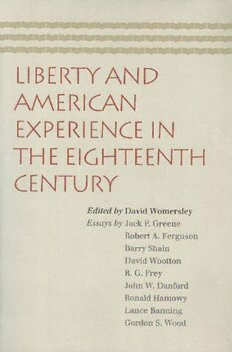
Liberty And American Experience In The Eighteenth Century PDF
401 Pages·2006·2.194 MB·English
Most books are stored in the elastic cloud where traffic is expensive. For this reason, we have a limit on daily download.
Preview Liberty And American Experience In The Eighteenth Century
Description:
Written by some of today's premiere scholars of American history, "Liberty and American Experience in the Eighteenth Century" examines some of the central themes and ideologies central to the formation of the United States. David Womersley's introduction includes a discussion of Edmund Burke's theories on property rights and government, setting the foundation for the various themes of liberty found in this volume. In "Of Liberty and the Colonies: A Case Study of Constitutional Conflict in the Mid-Eighteenth Century British American Empire", Jack Greene examines other forms of government and uses those examples to argue that the founding was not the conservative process that many have previously supported. Robert Ferguson explores the roles of law and religion in the formation of a free and liberal society in "The Dialectic of Liberty: Law and Religion in Revolutionary America". In "Religious Conscience and Original Sin: An Exploration of America's Protestant Foundations", Barry Shain supports Ferguson's contention that religion had a profound impact on the outlook of the colonists. John Danford, in "Riches Valuable at All Times and to All Men: Hume and the Eighteenth-Century Debate on Commerce and Liberty", examines the spiritual context of the Founders in regard to the Enlightenment, arguing that the Founders preferred known ways of governance and economics to untried and untested theory. "Moral Sense Theory and the Appeal to Natural Rights in the American Founding" by R G Frey suggests that there are conflicting viewpoints between moral sense theory and the idea of natural rights in the founding period. David Wootton presents an opposing view of the Founders in "Liberty, Metaphor, and Mechanism: Checks and Balances and the Origins of Modern Constitutionalism". He suggests that the ideas formed in the Enlightenment were seized upon by the Founders and that the result was a much more progressive system than could have been predicted. In "Scottish Thought and the American Revolution: Adam Ferguson's Response to Richard Price", Ronald Hamowy discusses the consequences of the colonial conflict and pays tribute to the intellectual force of American affairs. Lance Banning examines the divisions in thought among the revolutionaries regarding the nature of liberty and the manner in which liberty was to be preserved in "Federalism, Constitutionalism, and Republican Liberty: The First Constructions of the Constitution". In "Is There a James Madison Problem?", Gordon Wood presents the disparity in Madison's political thought from the 1780s to the 1790s. "Liberty and American Experience in the Eighteenth Century" provides an examination of various facets of the Founders' lives and thoughts, as well as their times, to help readers understand the events that went into their country's creation.
See more
The list of books you might like
Most books are stored in the elastic cloud where traffic is expensive. For this reason, we have a limit on daily download.
